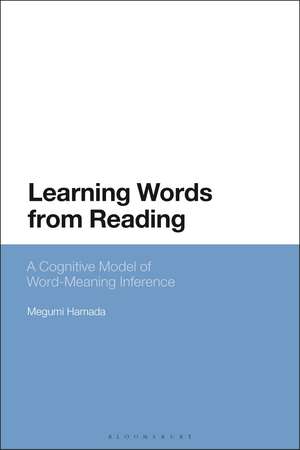Learning Words from Reading: A Cognitive Model of Word-Meaning Inference
Autor Dr Megumi Hamadaen Limba Engleză Paperback – 22 feb 2023
| Toate formatele și edițiile | Preț | Express |
|---|---|---|
| Paperback (1) | 189.61 lei 43-57 zile | |
| Bloomsbury Publishing – 22 feb 2023 | 189.61 lei 43-57 zile | |
| Hardback (1) | 543.19 lei 22-36 zile | +23.58 lei 6-12 zile |
| Bloomsbury Publishing – 11 aug 2021 | 543.19 lei 22-36 zile | +23.58 lei 6-12 zile |
Preț: 189.61 lei
Preț vechi: 248.43 lei
-24% Nou
Puncte Express: 284
Preț estimativ în valută:
36.28€ • 37.98$ • 30.20£
36.28€ • 37.98$ • 30.20£
Carte tipărită la comandă
Livrare economică 31 martie-14 aprilie
Preluare comenzi: 021 569.72.76
Specificații
ISBN-13: 9781350251700
ISBN-10: 1350251704
Pagini: 172
Dimensiuni: 156 x 234 x 25 mm
Greutate: 0.25 kg
Editura: Bloomsbury Publishing
Colecția Bloomsbury Academic
Locul publicării:London, United Kingdom
ISBN-10: 1350251704
Pagini: 172
Dimensiuni: 156 x 234 x 25 mm
Greutate: 0.25 kg
Editura: Bloomsbury Publishing
Colecția Bloomsbury Academic
Locul publicării:London, United Kingdom
Caracteristici
Details the pedagogical applications of the cognitive model for vocabulary instruction in real-world classrooms
Notă biografică
Megumi Hamada is Professor of English in the TESOL and Linguistics programs at Ball State University, USA.
Cuprins
Part I: What Do We Know About Incidental Word Learning from Reading?1. Theoretical Background in Word Learning from Reading2. Mechanism of Word Learning from Reading3. Factors in Word Learning from ReadingPart II: How Do We Obtain Information from Reading and Use It for Learning Words?4. Introducing the Cognitive Model of Word-Meaning Inference5. Extracting Word-Form Information and Using It for Word Learning6. Generating Contextual Information and Using It for Word Learning7. Pedagogical ApplicationsBibliographyIndex
Recenzii
This book effectively draws together key theories and empirical findings from various disciplines to clearly describe the processes involved in incidental learning of second language vocabulary from reading.
Hamada addresses a fundamental issue in L2 reading: How we Learn Words from Reading. She carefully reviews and categorizes the large and growing research on types of L1-L2 transfer effects (linguistic and contextual) and uses these findings to develop a coherent model of second-language word recognition and word learning: The Cognitive Model of Word-Meaning Inference.
Taking an interdisciplinary approach to research synthesis, Megumi Hamada explores incidental vocabulary learning from multiple perspectives, including linguistics, reading, and psychology. The book will serve as an insightful and valuable resource for students, teachers, and scholars in second language acquisition and language education.
This book provides a valuable resource on reading and vocabulary learning. It provides a succinct overview of the theoretical and empirical literature on incidental word learning and also covers the processes involved in inferring word meaning from reading. The book is laudable for its quality and clarity of presentation.
Hamada addresses a fundamental issue in L2 reading: How we Learn Words from Reading. She carefully reviews and categorizes the large and growing research on types of L1-L2 transfer effects (linguistic and contextual) and uses these findings to develop a coherent model of second-language word recognition and word learning: The Cognitive Model of Word-Meaning Inference.
Taking an interdisciplinary approach to research synthesis, Megumi Hamada explores incidental vocabulary learning from multiple perspectives, including linguistics, reading, and psychology. The book will serve as an insightful and valuable resource for students, teachers, and scholars in second language acquisition and language education.
This book provides a valuable resource on reading and vocabulary learning. It provides a succinct overview of the theoretical and empirical literature on incidental word learning and also covers the processes involved in inferring word meaning from reading. The book is laudable for its quality and clarity of presentation.
